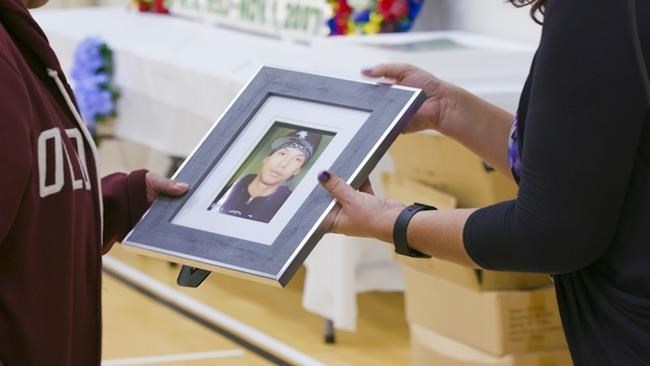
Poplar Hill First Nation student Reggie Bushie, as shown in this still image provided by documentary "Spirit-to-Soar' was in Grade 9 when he disappeared in Thunder Bay in fall, 2007. The fifteen-year-old student went to Dennis Franklin Cromarty High School. His body was found in the McIntyre River on Nov. 1, 2007. THE CANADIAN PRESS/HO-Spirit to Soar-Wendell Collier
*MANDATORY CREDIT*
April 28, 2021 - 2:08 PM
TORONTO - Four years after her acclaimed book "Seven Fallen Feathers" explored the deaths of Indigenous teens in Thunder Bay, Ont., journalist Tanya Talaga has returned to shine a new light on the ongoing colonial oppression there and across Canada.
In the new documentary "Spirit to Soar," the award-winning Anishinaabe author follows up on a 2015-'16 inquest into the deaths of seven First Nations high school students — five of whom were found dead in rivers — in the northwestern Ontario city from 2000 to 2011.
Talaga says four of the cases have been reopened but racism, indifference and more Indigenous deaths have First Nations youth there on edge.
"Sadly, things are progressing but not at all fast enough," said Talaga, who co-directed the film with Michelle Derosier.
"Our children are still dying in the water, our people are still dying on the streets. It is something that we are still living with."
The film debuts online Thursday at the Hot Docs Canadian International Documentary Festival. "Spirit to Soar" centres on the deaths of Jethro Anderson, Reggie Bushie, Robyn Harper, Kyle Morrisseau, Paul Panacheese, Curran Strang and Jordan Wabasse.
They were among hundreds of First Nations children who have had to leave their northern Ontario communities for a high school education in Thunder Bay. Many live alone in boarding homes of families they don't know.
In each case, an independent review concluded police didn't conduct proper investigations in finding the deaths undetermined or accidental.
A review by the Office of the Independent Police Review Director in December 2018 also found the Thunder Bay police service to be rife with racism and racist attitudes.
Some of the film's interview subjects, who range from Indigenous leaders to students, describe that racism and what they feel is a sense of indifference towards the teens' deaths.
"We haven't made a massive leap forward at all," said Talaga, whose mother's family is from Fort William First Nation in Ontario and whose father was Polish-Canadian.
"I lean on generational change that is needed, that we need to have the political will to make change. It is not acceptable that the Thunder Bay jail is full of our people, and the conditions that they're living in and the conditions that are now upon them due to COVID. It is not acceptable that we see videos, still, of our people being abused by officers. None of this is acceptable. It never was. And it will take generational change."
And it will take education, Talaga added.
Recalling a sentiment expressed to her by retired Sen. Murray Sinclair, who appears in the film, Talaga said "education got us into this mess" through settler mentality and the residential school system.
But change won't happen overnight.
"It's going to take time for our children to grow, our children to have a new curriculum that reflects the true history of this country, and for everyone to have that," Talaga said.
"Because until we have that and until that change is made, we're going to have people who don't know, like the people now in our societies — the lawmakers, the police, the judges, the politicians, the editors. They've all been raised not knowing about the true history of this country. And that needs to change in order for this country to move forward."
Talaga said the CBC plans to broadcast the documentary, which is also being translated in the Oji-Cree language.
Others who appear in the film include First Nations high-school students in Thunder Bay; Alvin Fiddler, Grand Chief at Nishnawbe Aski Nation; and Julian Falconer, lawyer for Nishnawbe Aski Nation.
Cameras capture stunning aerial footage of Thunder Bay from drones and Falconer's personal plane.
"You see the incredible physical beauty of Thunder Bay, and it's juxtaposed with some of the ugliest forms of racism on the continent," said Talaga.
It's a dichotomy the Toronto-based reporter feels deeply.
Despite its problems, Talaga said she loves Thunder Bay and northwestern Ontario. As she explains in her documentary, her mother was raised in Raith and Graham, Ont., outside of Thunder Bay, and Talaga would visit the area with her mother when she was young.
Talaga says she wants the film to show Thunder Bay youth that they are supported and loved.
"Their strength and their bravery is what drives all of us," said Talaga.
The film also has lighter moments – the camera follows some high school students to a music festival, and an annual hunting trip.
"Those are messages of hope," Talaga said. "And it shows the resilience and the strength of our youth. They're the backbone of the film."
This report by The Canadian Press was first published April 28, 2021.
News from © The Canadian Press, 2021